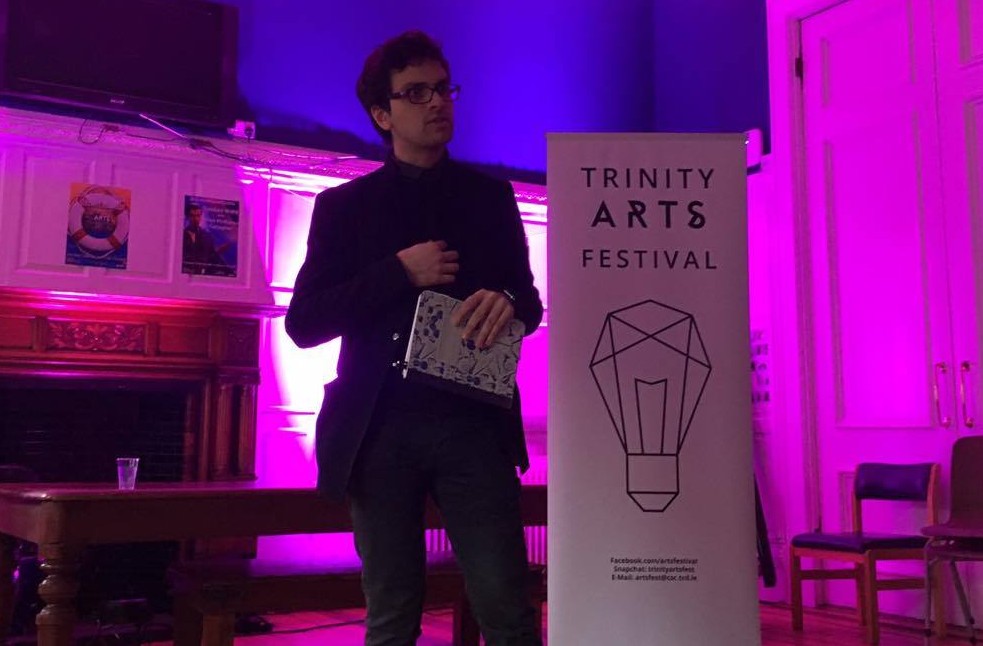As part of Trinity Arts Festival’s TAF Talks series, Rob Farhat spoke to an intimate crowd in the GMB this Tuesday about his experience with music. Farhat is a former Trinity student and Trinity Orchestra Auditor, who now runs the highly successful music company, Ensemble.
Rob began by talking about his experience in music education. Like many successful musicians, he started playing from a very young age – this, he explains, was heavily influenced by his father, a former Professor of Music here in Trinity. Rob quickly progressed through the ranks of the classical music scene and by his teens was playing in the Royal Irish Academy of Music, taught by the renowned John O’ Connor.
Farhat explained that although he was well on his way to becoming a successful professional concert pianist, in his heart he knew that it wasn’t what he wanted to do –his disillusionment with classical music stemming from the heavy emphasis on competitions and exams as opposed to the music itself. This, ultimately, lead him to the decision to study Philosophy, Politics, Economics and Sociology (PPES) at Trinity.
His describes this decision as being pivotal, as it was through his experience gained through society work in Trinity that he has ended up in the position he’s in today. He specifically praised PPES as it “enabled [him] to critically think in a way the Leaving Cert had not”. Farhat quickly became involved in the Trinity Orchestra, and in his Junior Sophister year became Auditor.
Famously in that year, Farhat put on his arrangement of Daft Punk through Trinity Orchestra, their first “mainstream popular music” arrangement – the video of which went globally viral, garnering close to a million views on YouTube, and ultimately, propelling Trinity Orchestra into both national and international fame.
Off the back of this success Trinity Orchestra began to play at Electric Picnic and other big-name concerts, which they continue to do today, as well as carrying on the tradition of performing popular music arrangements. Farhat, however, won’t take credit for pioneering this phenomenon, citing years prior to his own where Sigur Ros and Radiohead arrangements were performed, although on a smaller level.
Rob’s contribution to Trinity Orchestra didn’t stop here, as he gave insight into a submissions process he introduced in the society which led directly to the highly-successful Pink Floyd arrangement performed in 2012. He explained that it was submitted by a “quiet viola player who wouldn’t have had a way to voice themselves otherwise”.
He also worked to eradicate the cliques that existed in Trinity Orchestra, criticising the “established circles” that revolve around committee members in society groups. In his final year he chaired the CSC and gained a world of experience through his time in the role, explaining how it gave him “great experienced in working with backwards and disorganised systems, which reflects what it’s like to work in Ireland in general”.
Farhat is not one for holding back, and spoke honestly of his opinion about Trinity – he points out that although there is a widely held opinion of Trinity as one of Ireland’s “best universities”, graduating from Trinity does not necessarily set you above everyone else, and criticises Trinity Music Department for its conservative nature.
Criticism of music programmes is not limited to Trinity, however – he worries that there is no broad-base music degree available in Ireland, taking BIMM as an example, which he is concerned gears students to produce “hits” in a very formulaic manner.
He points out that Ireland has an “uncool image” abroad for its music, an image that is not helped by large bodies like MCD and the Arts Council, who are “geared towards funding the same people again and again”. His company, Ensemble, seeks to act as a middle ground between these two polars of commercialisation and conservatism.
.
Farhat ended his talk by encouraging everyone to “create art for yourself, and no-one else”, and after his thought-provoking talk, I shall certainly be keeping his words in mind.







